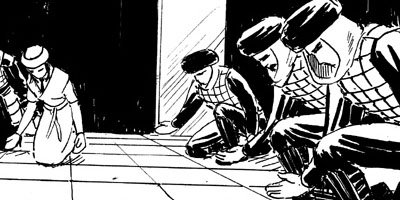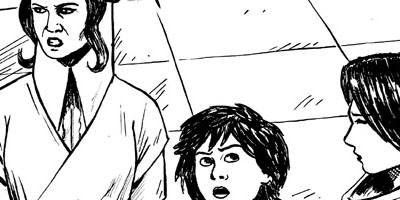I will freely admit, it has been a long, long time since John Byrne has been the kind of potent creative force he was back in the late 70s/early 80s. I don’t know how much of that is him being out of step with current comics trends, and how much of it is him starting to believe in his own myth to the point that he can’t accept constructive criticism anymore, but it has been a long time since he was anything other than a punchline. Which is why I feel like it’s worth mentioning just how good his Fantastic Four run really was.
At the time, the series was in something of a doldrums; Marv Wolfman’s run, while not actually bad, never managed to really strike many sparks. Byrne’s principal contribution was to revitalize the series by bringing back its classic Lee/Kirby foes like Diablo, Annihilus, Galactus and Doctor Doom, while finding ways to view them through a new light by concentrating on them as characters in their own right. Doom stopped being merely a snarling would-be worldbeater and became a complex, nuanced character with his own goals and code of warped ethics; one terrifyingly powerful storyline even suggested that Doom might have a point by showing that a Latveria without Doom was actually worse off than one he ruled. Annihilus was taken back to his roots as a raving paranoid and a devastating force of nature, and Galactus was re-envisioned as a cosmic entity beyond human understanding.
All this was combined with a lot of new material, too. Byrne’s Doctor Who-inspired exploration of the Negative Zone contained some wonderful self-contained, continuity-free stories, and he also had a strong run of early sci-fi stories like “The Man With the Power” which were conceptually very fine. In a modern, story-arc heavy world, we wouldn’t see something like these, but they were perfect for their era.
And he also did a great job of exploring the main characters. Susan endured a tragic miscarriage, and went through a lot of personal growth that led to her becoming the Invisible Woman. Johnny grew up in a lot of meaningful ways, ultimately turning into a responsible adult with a mature relationship, ready for marriage. And most controversially, the woman he was dating and ready to be married to (the wedding took place a few issues after Byrne left the title) was Ben’s old girlfriend, Alicia. Byrne’s treatment of Ben and Alicia’s relationship was both startlingly mature and bittersweet, and also a perfect outgrowth of what had come before. Ben constantly struggled with the question of whether he should end their relationship for her own sake, and finding out that she’d made the decision for him was part of a personal journey for Ben that really culminated a lot of the long-simmering tensions to the character. All that, while making Reed a likeable and well-drawn genius and quietly demonstrating his burdens as the leader of the FF and the steel beneath his “genial egghead” nature. (The scene where he tells Doc Ock that he knows he won’t have to personally escort him back to jail, because he’d be in a very bad mood if he had to chase him down, is startlingly effective.)
On the whole, I’d say this was one of the three best runs in FF history, and one I’m proud to own in its entirety. It’s been a long time since either Byrne or the FF was this good, but it’s worth savoring the whole thing.



